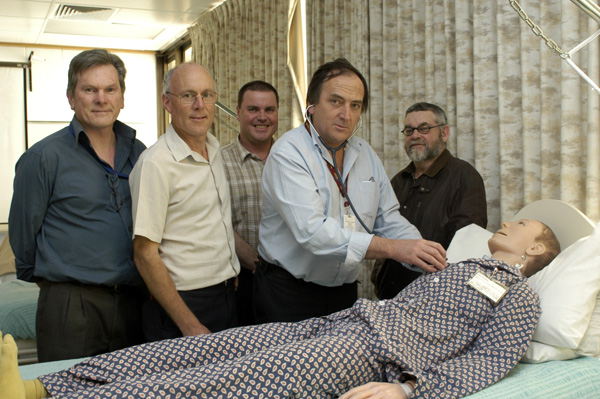Nosokinetics
Research in Action
Maths is good for your health
Prof Terry Mills
La Trobe University & Bendigo Health, Melbourne (comments to rjtechne@iol.ie)
(Reprinted with permission from La Trobe University Bulletin, Oct 2006, p10)
Hospitals need the skills of doctors, nurses, psychologists, physiotherapists, dieticians and technicians to ensure the health of patients. However, they cannot maximise patient health outcomes unless they also make use of the skills of mathematicians.

From Left to right K. Masman (Bendigo Health), R. Champion & L. Kinsman (La Trobe University) M. Taylor (Bendigo Health), Terry Mills (La Trobe University). photo by Brenden Fletcher, La Trobe University).
This is the view of Professor Terry Mills from the Department of Mathematics and Statistics at the Bendigo campus, a specialist in applying mathematics and statistics in health care.
Professor Mills, who has been teaching mathematics at the Bendigo campus since 1975, has worked as Honorary Senior Research Fellow at Bendigo Health since 1998. He says many problems in health care lend themselves to quantitative analysis.
‘We analyse data using methods from multivariate statistical analysis, and machine learning methods from computer science. We apply advanced quantitative ideas to practical problems in hospitals. ‘We also use our skills in these fields – and this has never before been applied to health care – to analyse the results of patient surveys.’
One major field concerns patient satisfaction. ‘Today there is a strong focus on patient-centred care. An important indicator in health care is the level of patient satisfaction, and this gives rise to the question as to what are the factors that distinguish between hospital patients who are, and are not satisfied?’
‘Patient satisfaction has a bearing on health care outcomes. Satisfied patients feel they have received value for money and time spent and, from a psychological aspect, feel better. This has a practical bearing on the result of health care because satisfied patients tend to obey advice from health carers about taking medicines, diet and exercise,’ Professor Mills says. Another project aims to forecast the demand for emergency services in Bendigo.
‘More than 30,000 patients go through Bendigo Health’s emergency department each year. If we can forecast not only the numbers, types of injury, and the busiest periods, it would greatly assist the rostering of staff.’ ‘We hope to have the result of this project by the end of the year. We are also looking at patient flow in general. To forecast this accurately is important because Bendigo Health is planning a new unit that offers transition care.’
‘This will help elderly people make a transition from hospital to home or other accommodation. In planning this facility, a key question is: How many places will be required in this new unit?” One answer can be obtained using mathematical modelling.
‘Another project is to determine how we can use mathematics to describe how patients flow through a hospital. This is part of a new branch of knowledge known as nosokinetics”.’ These projects are multidisciplinary and require the expertise of researchers, both clinicians and academics, from different professions at La Trobe and Bendigo Health.'
Professor Mills gave papers on results from his research at the ‘International Conference on Health and Social Care Modelling and Applications’ in Adelaide and the ‘Better State of Hospitals Conference’ in Melbourne, this year.
Some navigational notes:
A highlighted number may bring up a footnote or a reference. A highlighted word hotlinks to another document (chapter, appendix, table of contents, whatever). In general, if you click on the 'Back' button it will bring to to the point of departure in the document from which you came.Copyright (c)Roy Johnston, Ray Millard, 2005, for e-version; content is author's copyright,